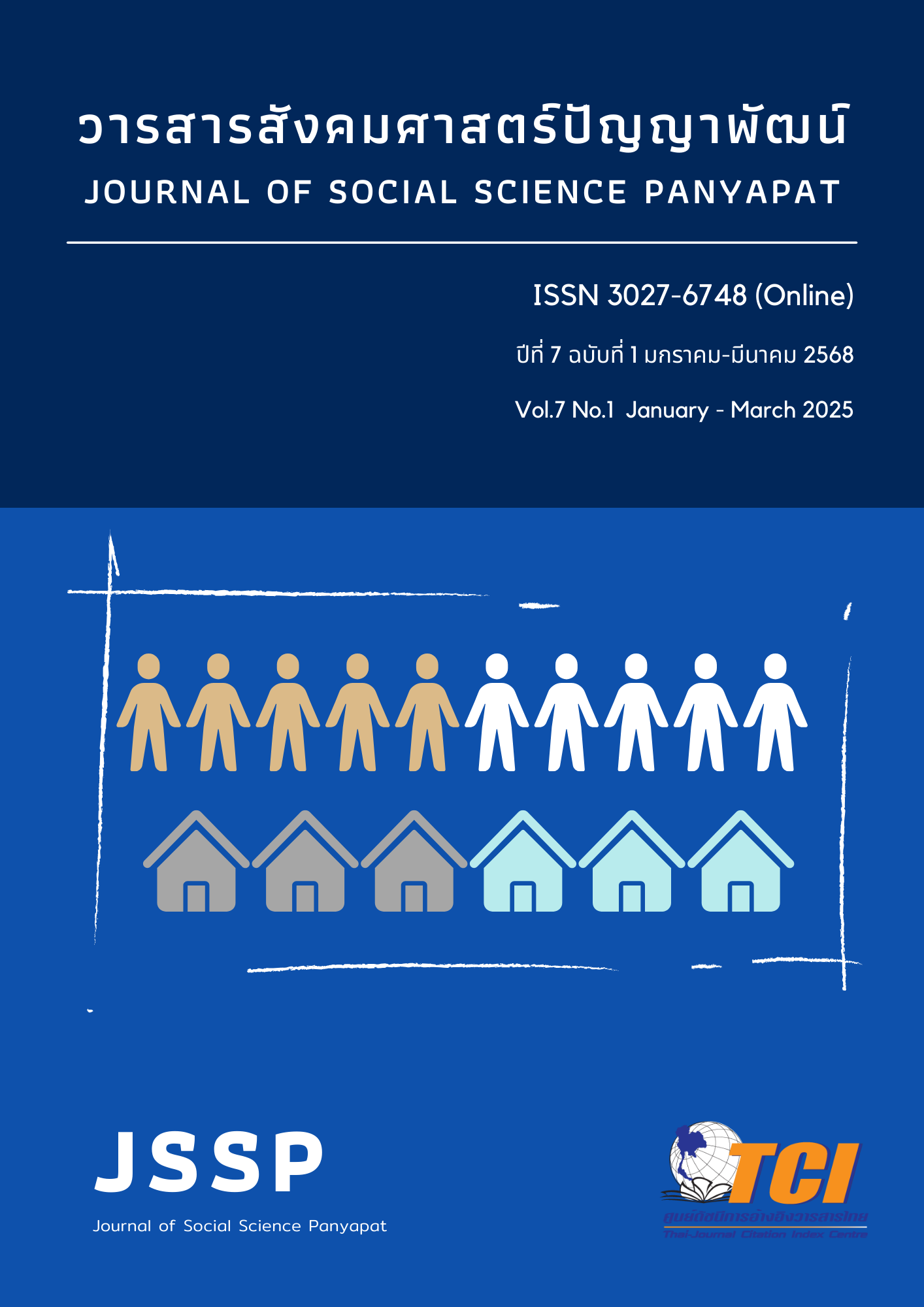กลยุทธ์การบริหารจัดการศึกษาระดับปฐมวัยโรงเรียนอนุบาลอำพรสู่มาตรฐานสากล
คำสำคัญ:
กลยุทธ์การบริหาร, การจัดการศึกษาระดับปฐมวัย, สู่มาตรฐานสากลบทคัดย่อ
บทความวิจัยนี้มีวัตถุประสงค์เพื่อ (1) ศึกษาจุดแข็ง จุดอ่อน โอกาส และอุปสรรคของโรงเรียนอนุบาลอำพร (2) ศึกษาองค์ประกอบของการจัดการศึกษาปฐมวัยสู่มาตรฐานสากล (3) สร้างกลยุทธ์การบริหารจัดการศึกษาระดับปฐมวัยสู่มาตรฐานสากลของโรงเรียนอนุบาลอำพร การวิจัยครั้งนี้เป็นการวิจัยเชิงคุณภาพ โดยการเก็บข้อมูลจากการสนทนากลุ่ม (Focus group) จากคณะกรรมการบริหารโรงเรียน 6 คน ประกอบด้วย ผู้อำนวยการ ผู้ทรงคุณวุฒิ ผู้แทนผู้ปกครอง และผู้แทนครู และการใช้กระบวนการวางแผนแบบมีส่วนร่วม (AIC) จากคณะกรรมการบริหารโรงเรียน 6 คน และผู้เชี่ยวชาญ 3 คน ผลการศึกษาพบว่า จุดแข็ง ใช้ Active Learning, Holistic Approach, เทคโนโลยี, PLC ครูมีความเชี่ยวชาญ ผู้บริหารมีวิสัยทัศน์ จุดอ่อน ขาดกลยุทธ์ด้านนวัตกรรมและภาษาต่างประเทศ ขาดแผนพัฒนาครูด้านเทคโนโลยี ระบบประกันคุณภาพยังไม่เป็นเครื่องมือหลัก โอกาส เงินอุดหนุนช่วยลดภาระ เทคโนโลยีดิจิทัลสนับสนุนการเรียนรู้ Active Learning และมารยาทไทยเป็นที่นิยม อุปสรรค นโยบายรัฐเปลี่ยนบ่อย เศรษฐกิจถดถอย ค่าใช้จ่ายเทคโนโลยีสูง อัตราการเกิดลดลง กฎหมายใหม่เพิ่มภาระ ส่วนองค์ประกอบของการจัดการศึกษาปฐมวัยสู่มาตรฐานสากล ประกอบด้วย (1) การบริหารงานวิชาการ (2) การบริหารบุคลากร (3) การจัดประสบการณ์ (4) การส่งเสริมพัฒนาการ และ (5) การมีส่วนร่วม กลยุทธ์การบริหารจัดการศึกษาระดับปฐมวัยของโรงเรียนอนุบาลอำพรสู่มาตรฐานสากล ประกอบด้วย (1) การยกระดับคุณภาพการเรียนการสอนสู่มาตรฐานสากล (2) การพัฒนาศักยภาพครูและบุคลากรทางการศึกษา (3) การส่งเสริมการเรียนรู้ที่เน้นผู้เรียนเป็นสำคัญ (4) การพัฒนาพัฒนาการของเด็กในทุกมิติให้มีคุณธรรมและทักษะชีวิต และ (5) การส่งเสริมความร่วมมือจากผู้ปกครองและชุมชน
เอกสารอ้างอิง
คณะกรรมาธิการการศึกษาวุฒิสภา. (2563). รายงานการพิจารณาศึกษา เรื่อง ข้อเสนอแนะเชิงนโยบายเร่งด่วน ว่าด้วยการบริหารการจัดการศึกษาในช่วงสถานการณ์การระบาดของโรคติดเชื้อไวรัสโคโรนา 2019 (COVID-19) ที่เหมาะสมกับสังคมไทย 11 มิ.ย. 2563. กรุงเทพฯ: สำนักงานเลขาธิการวุฒิสภา.
ธิติดา ลีลาปัญญาเลิศ, เกรียงไกร สัจจะหฤทัย และ สุบิน ยุระรัช. (2567). กลยุทธ์การบริหารการจัดการศึกษาปฐมวัยของโรงเรียนนานาชาติในประเทศไทย ตามแนวคิดการบริหารแบบมีส่วนร่วม. Journal of Social Science and Cultural, 8(1), 272-284.
เลิศชาย ปานมุข. (2559). กรอบแนวคิดของแมคคินซีย์ (McKinsey 7-S Framework). สืบค้นจาก https://www.lertchaimaster.com/forum/index.php?topic=930.0.
ศิริมงคล ทนทอง และ ศศิรดา แพงไทย. (2562). รูปแบบการจัดการศึกษาปฐมวัยยุคการศึกษา 4.0 ของสถานศึกษาสังกัดสำนักงานคณะกรรมการการศึกษาขั้นพื้นฐาน. วารสารบัณฑิตศึกษามหาจุฬาขอนแก่น, 6(3), 490-502.
สำนักงานคณะกรรมการส่งเสริมการศึกษาเอกชน. (2564). แผนพัฒนาการศึกษาเอกชน พ.ศ. 2560 – 2564. สืบค้นจาก https://opec.go.th/uploads/2023/plan/20230105_144543_837_3-1.pdf.
สำนักงานเลขาธิการสภาการศึกษา. (2563). รายงานการศึกษารูปแบบการจัดการศึกษาปฐมวัยของไทยและต่างประเทศ กรณีศึกษาประเทศญี่ปุ่น สิงคโปร์ ออสเตรเลีย และนิวซีแลนด์. กรุงเทพฯ: สำนักงานเลขาธิการสภาการศึกษา.
สำนักงานเลขาธิการสภาการศึกษา. (2564). สภาวะการศึกษาไทย 2564. สืบค้นจาก https://fliphtml5.com/wbpvz/atdc/basic#google_vignette.
สำนักงานสภาพัฒนาการเศรษฐกิจและสังคมแห่งชาติ. (2565). แผนพัฒนาเศรษฐกิจและสังคมแห่งชาติ ฉบับที่ 13 (พ.ศ. 2566 - 2570). สืบค้นจาก https://www.ratchakitcha.soc.go.th/DATA/PDF/2565/E/258/T_0001.PDF.
สิริกานต์ เอื้อธารากุล, ปพนสรรค์ โพธิพิทักษ์ และ สุพัฒนา หอมบุปผา. (2566). การพัฒนากลยุทธ์การบริหารสถานศึกษาสู่โรงเรียนมาตรฐานสากล. วารสารสันติศึกษาปริทรรศน์ มจร, 11(2), 543-558.
สุกรี แวมูซอ. (2562). องค์ประกอบและตัวบ่งชี้การบริหารเชิงกลยุทธ์ ของสำนักงานการศึกษาเอกชนในจังหวัดชายแดนภาคใต้. (ศึกษาศาสตรดุษฎีบัณฑิต, มหาวิทยาลัยหาดใหญ่).
โสภณ แย้มกลิ่น. (2567). PESTEL Analysis คืออะไร. สืบค้นจาก https://www.sophony.co/strategy/pestel-analysis-%E0%B8%84%E0%B8%B7%E0%B8%AD%E0%B8%AD%E0%B8%B0%E0%B9%84%E0%B8%A3/.
อาภา วรรณฉวี. (2564). การวิจัยเอกสาร (documentary research). สืบค้นจาก https://bsru.net/%E0%B8%81%E0%B8%B2%E0%B8%A3%E0%B8%A7%E0%B8%B4%E0%B8%88%E0%B8%B1%E0%B8%A2%E0%B9%80%E0%B8%AD%E0%B8%81%E0%B8%AA%E0%B8%B2%E0%B8%A3-documentary-research/.
Bozkurt, A., & Sharma, R. C. (2020). Emergency remote teaching in a time of global crisis due to CoronaVirus pandemic. Asian Journal of Distance Education, 15(1), 1-6.
Taylor, S. J., Bogdan, R., & DeVault, M. L. (2016). Introduction to qualitative research methods: A guidebook and resource. (4th Ed.). Hoboken, NJ: John Wiley & Sons.
Weihrich, H., Cannice, M., & Koontz, H. (2019). Management: A Global, Innovative, and Entrepreneurial Perspective. (15th Edition). India: Tata McGraw-Hill Education.
ดาวน์โหลด
เผยแพร่แล้ว
รูปแบบการอ้างอิง
ฉบับ
ประเภทบทความ
สัญญาอนุญาต
ลิขสิทธิ์ (c) 2025 วารสารสังคมศาสตร์ปัญญาพัฒน์

อนุญาตภายใต้เงื่อนไข Creative Commons Attribution-NonCommercial-NoDerivatives 4.0 International License.


